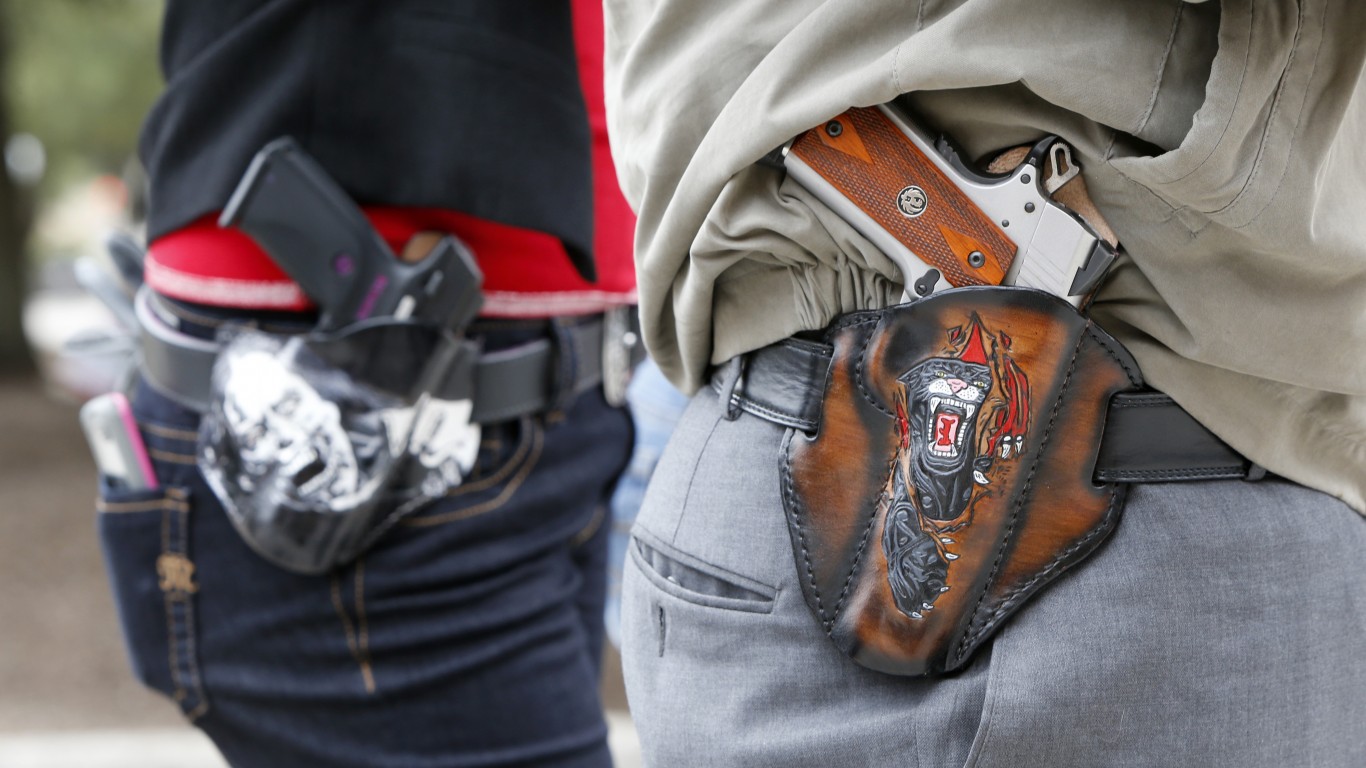 In the United States, the common law principle known as the “castle doctrine” allows individuals to use deadly force, if reasonable, to protect themselves from home intruders. Variations of the castle doctrine are the law of the land in all but a handful of states. But in recent years, a number of states have expanded on the principle, allowing individuals to use deadly force in public spaces under certain circumstances, even if they have the option to safely retreat. These statutes are commonly known as “stand your ground” or “shoot first” laws.
In the United States, the common law principle known as the “castle doctrine” allows individuals to use deadly force, if reasonable, to protect themselves from home intruders. Variations of the castle doctrine are the law of the land in all but a handful of states. But in recent years, a number of states have expanded on the principle, allowing individuals to use deadly force in public spaces under certain circumstances, even if they have the option to safely retreat. These statutes are commonly known as “stand your ground” or “shoot first” laws.
Unlike the castle doctrine, which is deeply rooted in historical precedent, stand your ground laws represent a meaningful departure from American legal tradition. According to gun control advocacy group Giffords Law Center, stand your ground laws increase the likelihood of avoidable violence and death — especially if firearms are involved, which, in states with these laws and weak gun control regulations, they often are.
Minnesota is a state that does not have stand your ground laws on the books and where citizens have a legal duty to retreat from potentially dangerous public confrontations if doing so safely is possible. State residents are also required to have a permit to carry a concealed firearm in public.
According to the Centers for Disease Control and Prevention, there were 573 firearm-related fatalities in Minnesota in 2021, or 10.0 for every 100,000 people, the ninth lowest gun death rate among the 50 states.
All data in this story on stand your ground laws and concealed carry regulations is from Gifford’s Law Center, a gun control advocacy group. It is important to note that policy details can vary by jurisdiction.
| State | Stand your ground laws? | Permitless concealed carry of a firearm | Firearm deaths per 100,000 people, 2021 | Total firearm deaths, 2021 |
|---|---|---|---|---|
| Alabama | Yes | Legal | 26.4 | 1,315 |
| Alaska | Yes | Legal | 25.2 | 182 |
| Arizona | Yes | Legal | 18.3 | 1,365 |
| Arkansas | Yes | Legal | 23.3 | 698 |
| California | No (some protections from legal precedent) | Illegal | 9.0 | 3,576 |
| Colorado | No (some protections from legal precedent) | Illegal | 17.8 | 1,064 |
| Connecticut | No | Illegal | 6.7 | 248 |
| Delaware | No | Illegal | 16.6 | 158 |
| Florida | Yes | Legal | 14.1 | 3,142 |
| Georgia | Yes | Legal | 20.3 | 2,200 |
| Hawaii | No | Illegal | 4.8 | 71 |
| Idaho | Yes | Legal | 16.3 | 309 |
| Illinois | No (some protections from legal precedent) | Illegal | 16.1 | 1,995 |
| Indiana | Yes | Legal | 18.4 | 1,251 |
| Iowa | Yes | Legal | 11.2 | 364 |
| Kansas | Yes | Legal | 17.3 | 503 |
| Kentucky | Yes | Legal | 21.1 | 947 |
| Louisiana | Yes | Illegal (with exceptions) | 29.1 | 1,314 |
| Maine | No | Legal | 12.6 | 178 |
| Maryland | No | Illegal | 15.2 | 915 |
| Massachusetts | No | Illegal | 3.4 | 247 |
| Michigan | Yes | Illegal | 15.4 | 1,544 |
| Minnesota | No | Illegal | 10.0 | 573 |
| Mississippi | Yes | Legal | 33.9 | 962 |
| Missouri | Yes | Legal | 23.2 | 1,414 |
| Montana | Yes | Legal | 25.1 | 280 |
| Nebraska | No | Legal (effective Sept. 2023) | 10.3 | 200 |
| Nevada | Yes | Illegal | 19.8 | 633 |
| New Hampshire | Yes | Legal | 8.3 | 123 |
| New Jersey | No | Illegal | 5.2 | 475 |
| New Mexico | No (some protections from legal precedent) | Illegal | 27.8 | 578 |
| New York | No | Illegal | 5.4 | 1,078 |
| North Carolina | Yes | Illegal | 17.3 | 1,839 |
| North Dakota | Yes | Legal | 16.8 | 128 |
| Ohio | Yes | Legal | 16.5 | 1,911 |
| Oklahoma | Yes | Legal | 21.2 | 836 |
| Oregon | No (some protections from legal precedent) | Illegal | 14.9 | 670 |
| Pennsylvania | Yes | Illegal | 14.8 | 1,905 |
| Rhode Island | No | Illegal | 5.6 | 64 |
| South Carolina | Yes | Illegal | 22.4 | 1,136 |
| South Dakota | Yes | Legal | 14.3 | 128 |
| Tennessee | Yes | Legal | 22.8 | 1,569 |
| Texas | Yes | Legal | 15.6 | 4,613 |
| Utah | Yes | Legal | 13.9 | 450 |
| Vermont | No (some protections from legal precedent) | Legal | 11.9 | 83 |
| Virginia | No (some protections from legal precedent) | Illegal | 14.3 | 1,248 |
| Washington | No (some protections from legal precedent) | Illegal | 11.2 | 896 |
| West Virginia | Yes | Legal | 17.3 | 319 |
| Wisconsin | No | Illegal | 13.5 | 793 |
| Wyoming | Yes | Legal | 26.1 | 155 |


